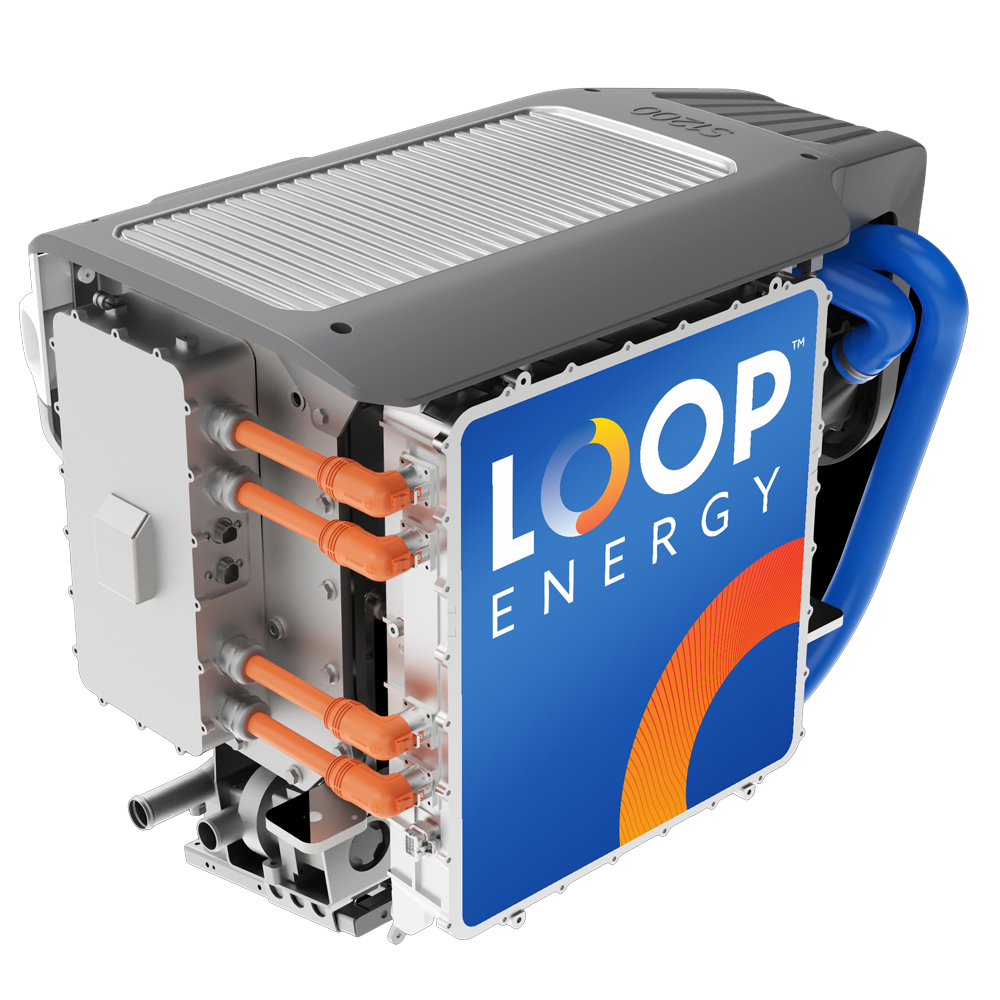Vancouver-based manufacturer of hydrogen fuel cells for commercial mobility, Loop Energy, unveiled a 120 kW fuel cell system that reportedly provides an additional efficiency gain of 20% when it generates electricity. “The S1200 is designed to deliver up to 60% in net system efficiency, this efficiency enables an electric vehicle powered by a Loop Energy fuel cell to deliver up to 54% fuel to wheel efficiency compared to the typical fuel to wheel efficiency delivered by a diesel engine powered vehicle of 20% to 25,” the company said in a statement. Loop Energy uses a trapezoid plate with narrowing channels for its bipolar plates, which reportedly increases gas velocity down the plate to deliver higher fuel efficiency and power output. The company believes this new product allows fuel cost parity with diesel up to eight years earlier than previously considered possible.
French train manufacturer Alstom has demonstrated the effectiveness of its hydrogen-powered solutions for long-distance transportation. “During a long-distance journey, an unmodified serially-produced Coradia iLint train covered 1,175 kilometers without refueling the hydrogen tank,” the company said. The train departed in Lower Saxony, in northern Germany, and arrived in Munich, in the southern part of the country.
Governments and companies should coordinate to increase commitments for the use of low carbon and renewable hydrogen while agreeing on certification schemes focused on emissions, safety, and operational issues such as leakage. This is one of the main conclusions of the “Breakthrough Agenda Report 2022” published by the International Energy Agency (IEA). Purchase commitments should support investments in production, which must scale from less than 1 Mt in 2020 to around 140-155 Mt per year by 2030. “Hydrogen deployment consistent with a 1.5C-aligned pathway will require an annual investment of around $60-130 billion through to 2030, relative to the less than $1 billion invested annually, on average, over the last decade,” reads the paper. The IEA also stresses the importance of low-carbon infrastructures, making a case for hydrogen gas pipelines.
Morocco's research institute IRESEN has installed a photovoltaic powered 20 kW hydrogen production system. The project is part of its “Power-to-X µPilot” initiative and is aimed at testing the electrolyzer under a variable renewable electricity load. Developed with Mohammed VI Polytechnic University (UM6P), the project is incubated at the heart of the Green Energy Park in Ben Guerir, Morocco. It aims to integrate technologies and innovations emerging from the value chain of the green hydrogen sector.
The Port of Rotterdam Authority has awarded the contract for constructing a new hydrogen and CO2 pipeline along the Europoort to Swietelsky Rail Benelux. “The new pipeline strip will be 7.60 meters wide, creating space for six or seven cables and pipes. The project is scheduled for completion at the end of 2023,” the authority said.
Ireland’s first green hydrogen company, EIH2, the Port of Cork, and the Port of Amsterdam signed a memorandum of understanding to use Irish offshore wind for green hydrogen production. The deal should establish a supply chain between Ireland and Europe via the port of Amsterdam.
TECO 2030 has launched a new product concept for its containerized fuel cells. “The solution comprises TECO 2030 fuel cell modules, batteries, power electronics, safety- and automation systems, hydrogen storage, and a refueling solution. The concept forms a scalable multimegawatt solution for electricity production for shore power from hydrogen,” said the Norwegian company.
This content is protected by copyright and may not be reused. If you want to cooperate with us and would like to reuse some of our content, please contact: editors@pv-magazine.com.



By submitting this form you agree to pv magazine using your data for the purposes of publishing your comment.
Your personal data will only be disclosed or otherwise transmitted to third parties for the purposes of spam filtering or if this is necessary for technical maintenance of the website. Any other transfer to third parties will not take place unless this is justified on the basis of applicable data protection regulations or if pv magazine is legally obliged to do so.
You may revoke this consent at any time with effect for the future, in which case your personal data will be deleted immediately. Otherwise, your data will be deleted if pv magazine has processed your request or the purpose of data storage is fulfilled.
Further information on data privacy can be found in our Data Protection Policy.